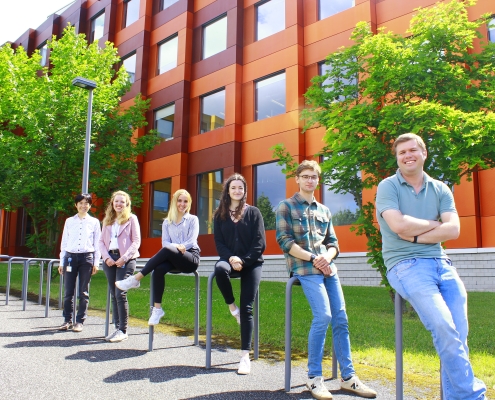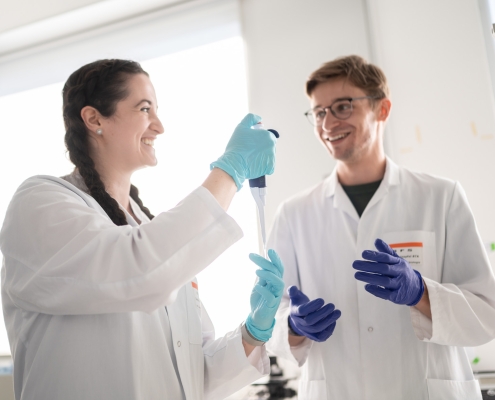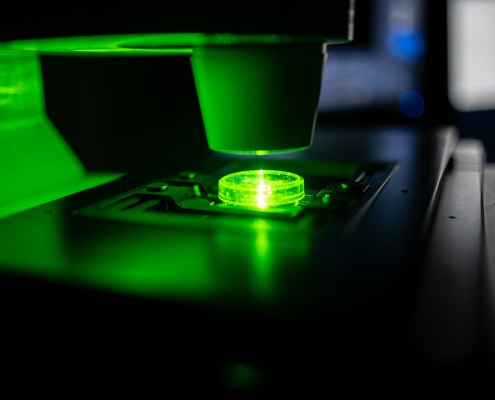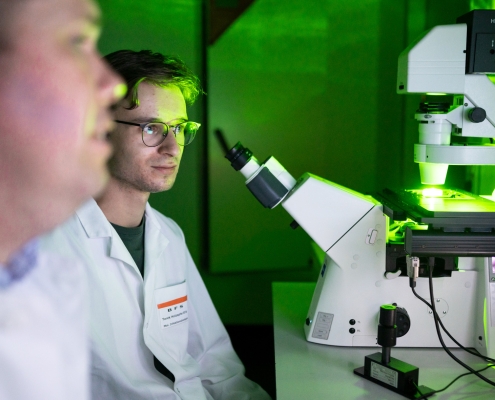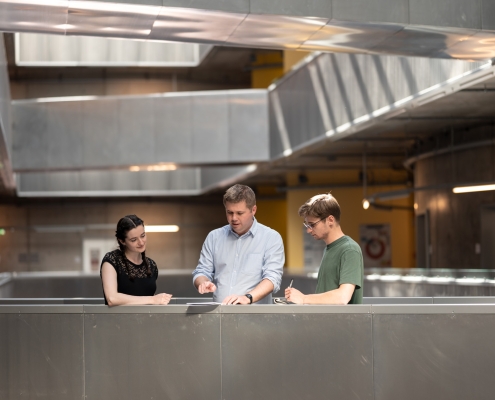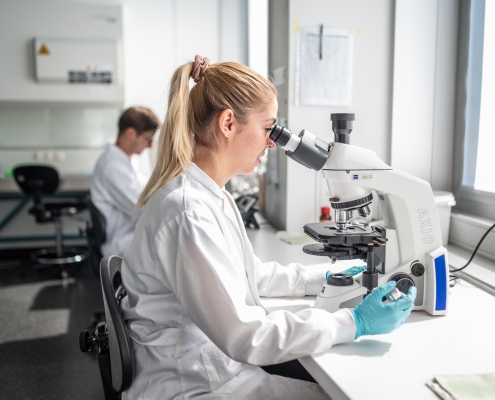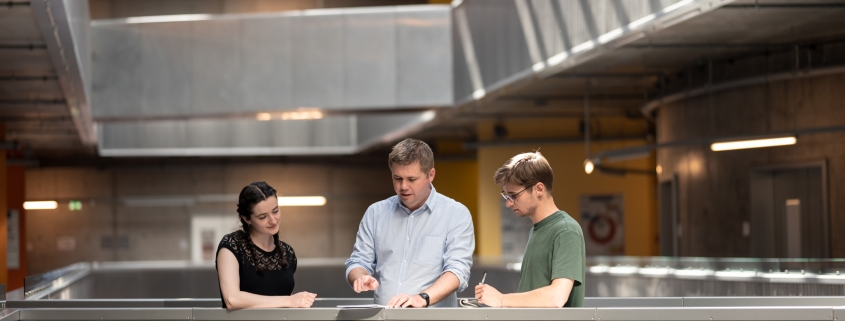
With continuity against malaria
03.11.2022 / Text: Alexandra von Knobloch / Fotos: Sascha Mannel
With continuity against malaria
Malaria is the field of research of Ross Douglas, PhD. Drugs are available to treat the disease. But to get a better handle on it worldwide, more new drugs are needed. Douglas is looking for targets for a more effective combination therapy.
Many long-distance travelers are familiar with the situation: In numerous regions of the world, they are supposed to use a prophylactic drug to protect themselves against the pathogen that causes malaria, the Plasmodium parasite. Anti-mosquito sprays, skin-covering clothing and mosquito nets around the bed are also obligatory. If the feverish illness still catches you, you have to go to the clinic and are usually given a mix of different medicines. One drug alone is rarely enough to cure a Plasmodium infection, which can be fatal if left untreated.
A disease with devastating effects
Even when patients receive the best available treatment, this tropical disease is stressful and difficult to manage. Globally, malaria is “destructive,” says Ross Douglas, PhD. The 37-year-old medical biochemist heads a DRUID junior research group at Justus Liebig University in Giessen, Germany. With his team, he is looking for sore spots in the parasites that could help develop further antimalarial drugs to make treatment more effective overall and possibly even curb the spread of the disease.
There are an estimated 200 million cases of malaria worldwide each year. About 600,000 people die from it – mostly children under the age of five. “What this is doing to people, and how it’s affecting countries economically as well, is devastating,” Douglas says. “It is an ongoing research task to develop prevention, treatment and care for malaria – an enormous challenge,” he stresses. “But as a global community of researchers in this field, we can keep finding new approaches and improve the overall situation.”
The pathogen is elusive
The reason for Douglas’ assessment: the life cycle of the Plasmodium pathogen, of which there are several species, is among the most complicated on this planet. The animal-like protozoa pass through various stages during their development: they migrate back and forth between mosquitoes and humans and live in the liver and blood of humans. There are forms that reproduce by division, those that reproduce sexually, infectious forms and those that can survive inconspicuously in the host organism for years.
Ross Douglas and his collaborators are conducting research to eliminate the malaria pathogen just as it is trying to pass from humans into mosquitoes – which then transmit it to the next person via a bite. “Most anti-malarial drugs currently available attack blood stages of the parasite. An agent that interferes with transmission to the mosquito would be a valuable addition to combination therapy,” he explains. They could capture the parasite at a life stage that other agents have so far missed. If they succeeded in limiting transmission to mosquitoes, the overall number of people affected by malaria would possibly fall in the long term. Simply because fewer infected mosquitoes also spread the disease less.
Targeting the parasite’s ability to move
Douglas’ target is the actin cytoskeleton in the parasite cell: a network of proteins that, among other things, strengthens and structures cells. With its help, Plasmodium can also move – and thus make their way into the mosquito. Actin is a protein that occurs in higher organisms. In humans, for example, muscle fibers are also made of actin. The substance enables the fibers to move against each other. In the end, therefore, human movements are based on actin. However, the actin cytoskeleton of humans differs from that of other pathogens – in this case Plasmodium – to such a large extent that it is in principle possible to stop it in the pathogen with potential drugs without causing damage to the host.
Through the DRUID project, Douglas has two master’s students, a doctoral student and a part-time technical assistant working on the parasites. “We’ve already succeeded in discovering some factors that are so important to the transition of the parasite to mosquitoes that transmission doesn’t work without them,” Douglas reports. “Exciting,” he says, are these discoveries – and so new that they need to be studied in more detail before they find their way into a scientific publication.
From South Africa to Germany
The LOEWE center DRUID, financed by the German state of Hesse, enables Ross Douglas’ group of young researchers to investigate in detail the basis for possible future drug development. Among other things, the team members are investigating the genetic level. And they are using the microscope to look at how parasite cells change when certain proteins are altered in them.
Being able to observe the finest details inside cells is what drew Ross Douglas to parasite research. Douglas, who comes from South Africa, had studied medical biochemistry in Cape Town and had already worked on proteins in his doctoral thesis. During a lecture by Prof. Dr. rer. nat. Friedrich Frischknecht from Heidelberg, he then became aware of imaging techniques that also make it possible to record the location of proteins in Plasmodium. Researchers can thus virtually watch tiny cells come to life. After that talk, Douglas saw “all his interests as a medical biochemist coming together.”
He applied for a postdoctoral position in integrative parasitology at the Center for Infectious Diseases at Heidelberg University Medical School and moved to Heidelberg in 2013. Since 2020, he has continued his research on malaria with the DRUID junior research group in Giessen. The contact with Heidelberg continues. Networking is an important approach of the LOEWE Center DRUID to advance research against poverty-associated and neglected tropical diseases.
Strong research community against malaria
“Wonderful opportunities” are opening up this way, Douglas thinks. Especially since the community of malaria researchers in Germany and Europe complement each other very well. “We cover all aspects of malaria research here, from basic molecular research to clinical research,” Douglas reports. “And we have all the scientific tools in hand to work together to make a positive difference.”
He describes what he does as working on a pipeline: Different research groups occupy different positions along the way, trying to work on the target molecules coming through the pipeline so they can push them one stop further. In the end, a new drug flows out. However, one of the realities of drug discovery is that only a small fraction of what is put into the pipeline at the beginning makes it all the way through. Ross Douglas’ research group is concerned with filling the pipeline: with target proteins worth seeking drugs for. “It’s a great achievement for any researcher to accomplish something like this,” he says, describing the realities of science.
On your own, he points out, you rarely have a chance. But thanks to the community, he says, malaria research is in a strong position against Plasmodium, which is so difficult to combat. With one caveat: “We can’t feel safe just because there are currently some drugs that work against malaria. Research must continue on an ongoing basis so that we are prepared when resistance emerges.”
Contact
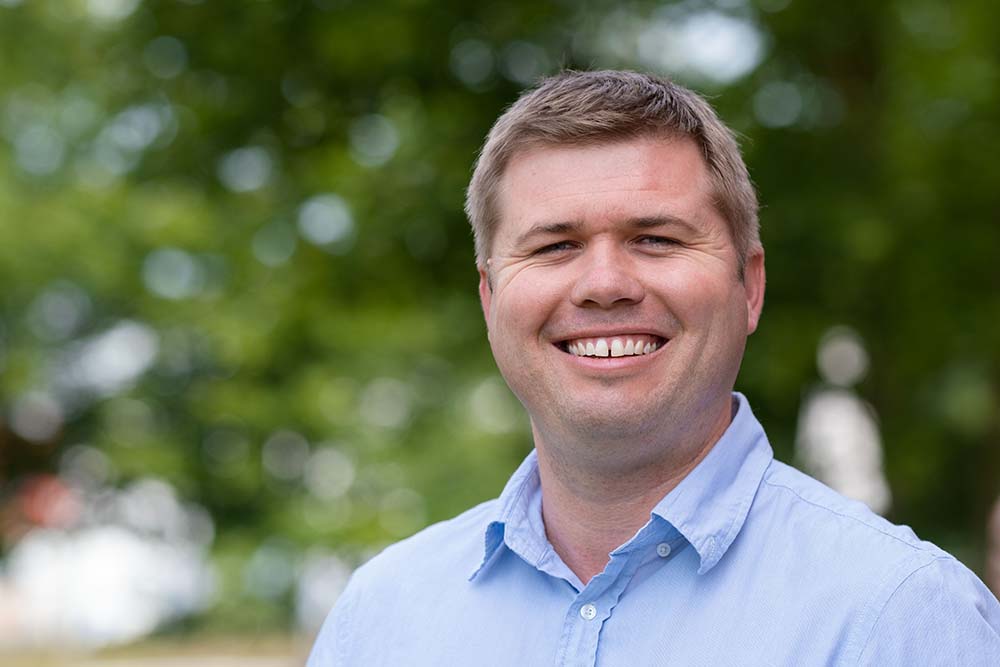
Dr. Ross Douglas
Biomedical Research Center Seltersberg (BFS)
Molecular Infections Biology
Justus Liebig Universität Giessen
Schubertstrasse 81
35392 Gießen
Tel.: +49 (0)641-99 39145
Fax: +49 (0)641-99 39129
E-Mail: ross.g.douglas(at)ernaehrung.uni-giessen(dot)de

